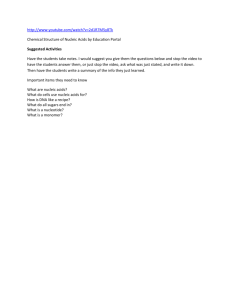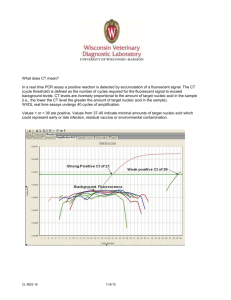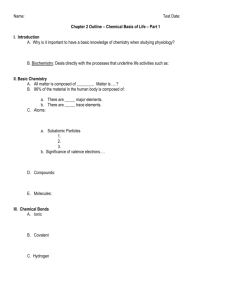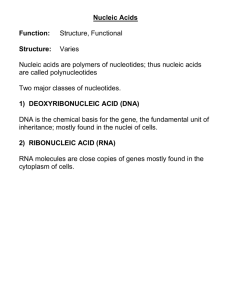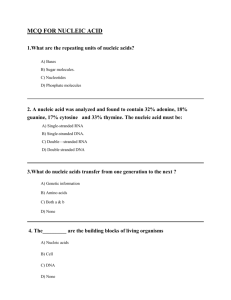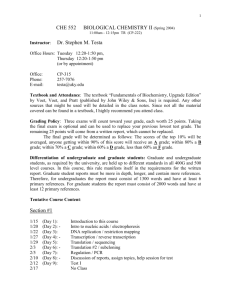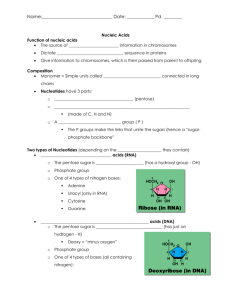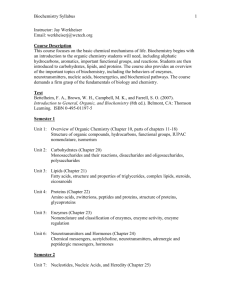COVENANT UNIVERSITY COLLEGE OF SCIENCE
advertisement
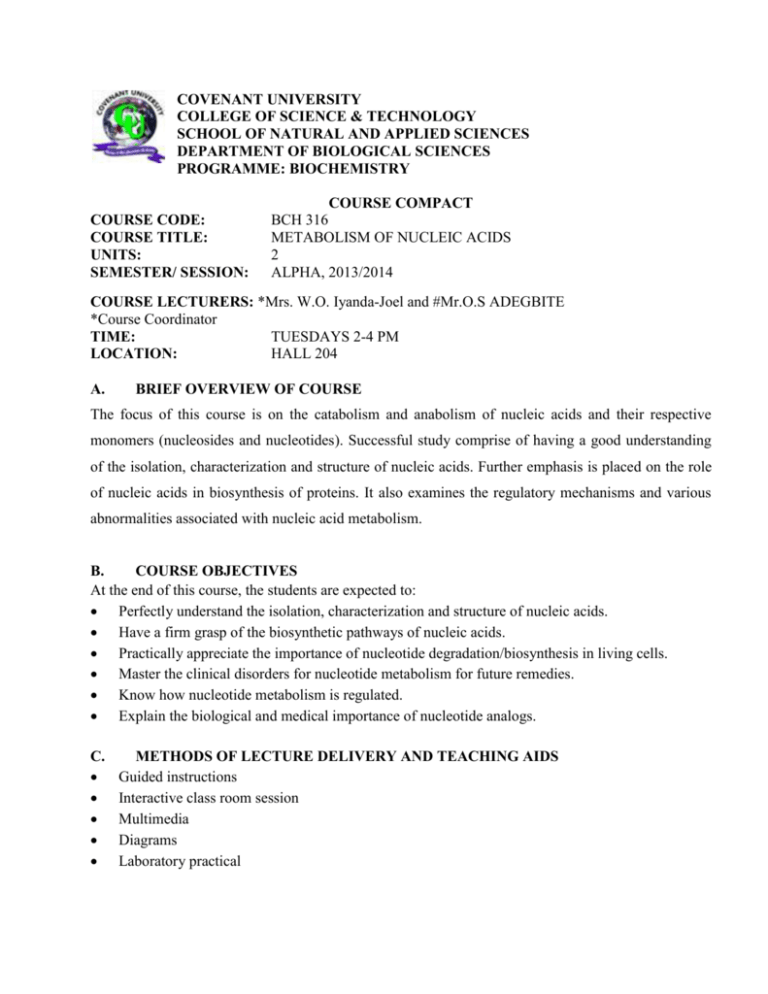
COVENANT UNIVERSITY COLLEGE OF SCIENCE & TECHNOLOGY SCHOOL OF NATURAL AND APPLIED SCIENCES DEPARTMENT OF BIOLOGICAL SCIENCES PROGRAMME: BIOCHEMISTRY COURSE CODE: COURSE TITLE: UNITS: SEMESTER/ SESSION: COURSE COMPACT BCH 316 METABOLISM OF NUCLEIC ACIDS 2 ALPHA, 2013/2014 COURSE LECTURERS: *Mrs. W.O. Iyanda-Joel and #Mr.O.S ADEGBITE *Course Coordinator TIME: TUESDAYS 2-4 PM LOCATION: HALL 204 A. BRIEF OVERVIEW OF COURSE The focus of this course is on the catabolism and anabolism of nucleic acids and their respective monomers (nucleosides and nucleotides). Successful study comprise of having a good understanding of the isolation, characterization and structure of nucleic acids. Further emphasis is placed on the role of nucleic acids in biosynthesis of proteins. It also examines the regulatory mechanisms and various abnormalities associated with nucleic acid metabolism. B. COURSE OBJECTIVES At the end of this course, the students are expected to: Perfectly understand the isolation, characterization and structure of nucleic acids. Have a firm grasp of the biosynthetic pathways of nucleic acids. Practically appreciate the importance of nucleotide degradation/biosynthesis in living cells. Master the clinical disorders for nucleotide metabolism for future remedies. Know how nucleotide metabolism is regulated. Explain the biological and medical importance of nucleotide analogs. C. METHODS OF LECTURE DELIVERY AND TEACHING AIDS Guided instructions Interactive class room session Multimedia Diagrams Laboratory practical D. COURSE OUTLINE *Module 1 Isolation, characterization, function of nucleic acids and protein synthesis Week 1 Occurrence and isolation of nucleic acids Week 2 Classification and review of nucleic acids structure Week 3 Role of nucleic acids in protein biosynrthesis #Module 2 Week 4 Week 5 Week 6 Degradation of purine and pyrimidine biosynthesis Nucleic acid degradation and its importance Complete degradation of purine nucleotides Complete degradation of pyrimidine nucleotides Mid-Semester Test *Module 3 Week 7 Week 8 Week 9 Biosynthesis of purine and pyrimidine nucleotides De novo biosynthesis of purine nucleotides and its control De novo biosynthesis of pyrimidine nucleotides and its control Synthesis of ribonucleotides and deoxyribonucleotides #Module 4 Week 10 Week 11 Week 12 Week 13 Week 14 Regulation of nucleic acid and metabolism and related disorders Regulation of nucleic acid metabolism Abnormalities in nucleic acid metabolism Anticancer drugs and their effects on the synthesis of DNA Tutorials Revision and evaluation E. i. ii. TUTORIALS Isolation of Nucleic acids and regulation of metabolism Biosynthesis and degradation of Nucleic acids F. 1. (i) (ii) 2. STRUCTURE OF THE PROGRAMME/ METHOD OF GRADING Continuous Assessment 30 Marks Test 1/ Test 2 15 Marks Mid-Semester Test 15 Marks Semester Examination 70 Marks G. GROUND RULES AND REGULATIONS The following ground rules and observations shall be observed: Mandatory 75% class attendance. No eating or dozing in the classroom or laboratory. Active participation in all activities. All class assignments must be submitted on time Punctuality to classes must be observed H. TOPICS FOR TERM PAPERS/ ASSIGNMENTS (i) Methods of isolating DNA and RNA from plant and animal sources (ii) Structure of Nucleic acids (iii) Discuss the central dogma of molecular biology (iv) Comprehensive essay on de novo pathway of purine and pyrimidine biosynthesis (v) Comprehensive essay on salvage pathway of purine and pyrimidine biosynthesis (vi) Write extensively on the complete degradation of purine nucleotide (vii) Regulatory/Control points in Nucleic acids metabolism (viii) Disorders associated with purine degradation H. ALIGNMENT WITH UNIVERSITY VISION AND GOALS This course will build capacity in the aspect of equipping students with adequate skills in basic biochemistry, which is vital for application in research projects I. INDUSTRIAL RELEVANCE Knowledge garnered from this course shall be relevant in the medical, food, biotechnology and agricultural industries. J. 1. 2. 3. 4. 5. RECOMMENDED READING Lehninger, A. Principles of Biochemistry (5th edition) Horton H. A. et al. Principles of Biochemistry (4th edition) Stryer, L. Biochemistry (4th edition). Campbell,M.K and Farrell,S.O. Biochemistry (6th Edition) Russell et al. Biology, the dynamic science (ISE).
